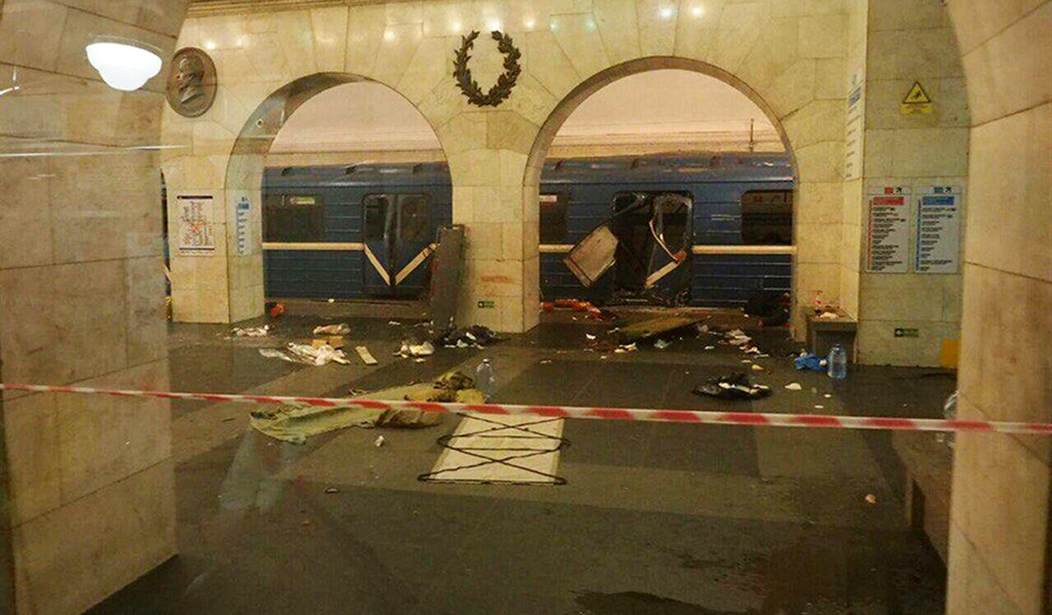Russia may find that regaining superpower status carries its own costs — although that may not be quite as much a revelation as Colin Clarke suggests. Writing in Politico, the Rand Corporation counterterrorism expert acknowledges that it is still too soon to be sure that today’s attack on the St. Petersburg mass-transit system was conducted by a radical Islamist terror network. However, Russia’s increasing interventionism against ISIS in Syria and now in Libya has begun a shift in targeting for such terror groups away from the US and toward Vladimir Putin’s regime:
Russia is fast replacing the United States as the No. 1 enemy of al Qaeda, the Islamic State, and other Sunni jihadist groups motivated by violent and puritanical Salafist ideology.
This shift is rooted in recent Russian actions in the Middle East—including its escalating intervention in Syria and its moves toward intervention in Libya with the recent deployment of special forces to an air base in Egypt—that have drawn the ire of militant Sunnis worldwide and elevated Russia as the jihadists’ top target. And if the Islamic State’s “caliphate” in Syria collapses and foreign fighters, an estimated 2,400 of whom are from Russia, attempt to return home and fix their sights on the Kremlin, the situation could dramatically worsen for Moscow.
Terrorist groups have made their changing priorities clear. In an ISIS video titled “Soon Very Soon Blood Will Spill Like an Ocean,” an ISIS fighter threatens Russian leader Vladimir Putin directly, citing the country’s intervention in Syria and its growing alliance with Syrian dictator Bashar al-Assad, Iran and the Lebanese terrorist group Hezbollah as proof that Moscow is the chief proponent of a growing Shiite axis throughout the Middle East. Forty other Syrian rebel groups have concurred, pointedly saying that “any occupation force to our beloved country is a legitimate target.”
To some extent, though, this depends on how exactly one defines “other Sunni jihadist groups.” If it includes those operating in Chechnya, and to smaller extents in Dagestan, Ingushetia, and other semi-autonomous republics in the northern Caucasus, then Russia has been a number-one target all along. In Chechnya alone, armed conflict between Russians and either nationalist or Islamist Chechens goes back to 1785. In more recent years, Chechen separatists have been responsible for a number of bloody terrorist attacks, including the 2010 bombings of the Moscow metro, the atrocities in Beslan in 2004, the 2002 seizure of a Moscow theater, and a 2011 bombing of a Moscow airport. Total civilian deaths in just these incidents exceed six hundred in total over fifteen years, plus a few dozen of the terrorists, and sporadic fighting continues in Chechnya to this day.
Clarke focuses specifically on ISIS, of course, excluding Russia’s internal conflicts in the Caucasus. Russian attacks on ISIS positions have begun to pick up, and Putin has clearly made Bashar al-Assad’s survival as dictator a high priority. That does make Russia a bigger target for ISIS and perhaps for other Sunni radicals, but the question will be how long that threat lasts. ISIS has a unique position among jihadi terror networks in that it holds significant territory — which it is presently losing — and its legitimacy depends on its ability to survive.
If Raqqa falls to Assad’s forces, the so-called caliphate will lose its supposedly divine credibility, and the remnants might not be terribly interested in waging any kind of war in the future that doesn’t involve nationality to some extent. A few of the militants may come to Chechnya to boost the Islamists still waging a guerilla war in the Caucasus, but that’s a threat that Russia already understands. The risk-reward calculation for Putin probably falls heavily onto the interventionist column, especially to have Assad in place as a client in the Middle East and force a seat at the table.
Some are already postulating that Putin might use today’s terror attacks to consolidate and expand his power, and indulging in even deeper conspiracy-theory thinking, according to the Daily Beast’s Anna Nemtsova:
Since Vladimir Putin came to power in 1999, Russians have heard about hundreds of terrorist attacks—bombed apartments, cars, buildings, trains, and airplanes.
Putin has taken advantage of these so frequently to consolidate his power that people often tend, with no proof, to believe conspiracy theories suggesting the involvement of Russia’s special services or various powerful clans behind the attacks. …
Some blamed the tragedy on Russia’s involvement in Syria, others on the poor work of the FSB, the state security service. “Authorities have found out how to distract people’s attention from protests,” a blogger, Daria Zhukova, said in her post on Republic.ru website. …
On Monday, people in Moscow could feel the pain of victims and families in Saint Petersburg. But at the fashionable Jean-Jacques Café, one young man asked a friend, “I wonder who are they going to blame for this now.”
To which his friend responded, “I always wonder, whoever kills people, why they do not blow up government buildings instead of targeting completely innocent metro passengers.”
That’s an easy question to answer. Governments around the world began hardening security at their own facilities decades ago, which makes it more difficult for terror plotters to succeed. Terrorists attack civilians because it’s easier to do so, and because they hope to panic the population and force the government to surrender to their demands. However, when governments have little transparency and accountability and leaders cling to power, conspiracy theories will grow and grow in the face of common sense.








Join the conversation as a VIP Member